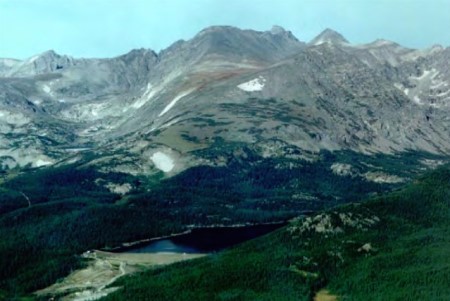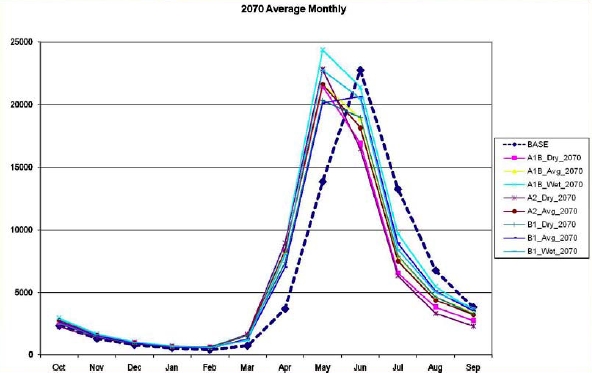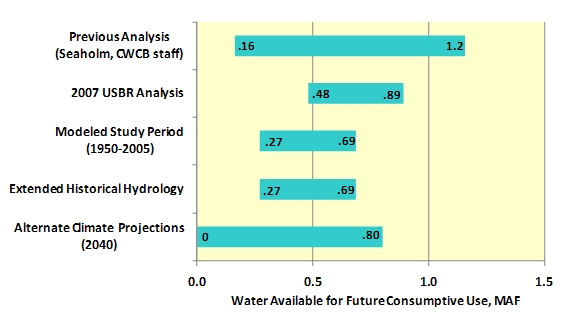Climate change may not significantly affect total precipitation in the City of Boulder’s watershed, but it will cause warmer temperatures in our area, earlier spring run-off, increased variability of supply, and drier summers two local experts predicted at a PLAN-Boulder forum on the evening of October 25.
Ben Harding and Lee Rozaklis, two principal engineers at the Boulder office of AMEC Earth and Environmental Inc. (formerly known as Hydrosphere), described in some detail the work they have done in the last few years modeling the effects of climate change on the Colorado River basin and on the Boulder Creek watershed. They noted that, from estimates of total emissions to predictions of runoff, the highest uncertainty is in the global circulation modeling and cautioned that there is less confidence in projections for areas located in the middle of continents at the middle latitudes, near mountains, such as Boulder.
Rozaklis recounted that in the 1970s the city’s water officials were aggressively acquiring water rights to prepare for an ultimate population of 200,000, while at the same time its Open Space program was aggressively acquiring land to limit population sprawl. As a result of this seeming dysfunction, the city is blessed with a relatively abundant water supply. Consequently, he said, Boulder will almost always be able to meet its “reliability criteria,” even in the face of climate change. Those criteria are that in a drought of one-year-in-twenty severity, the city will be able to fully satisfy all water needs; in a drought of one-year- in-one-hundred severity, some landscaping will not be irrigated, but other needs will be satisfied; and that in a drought of one-year-in-a-thousand severity, essential water needs will be satisfied, but no others.
Rozaklis also commented that if the total demand for water at maximum development turns out to be less than expected, the reliability of the city’s water supply will increase. In other words, water shortages would be less severe and/or prolonged. At this time the city’s water use is about 19, 400 acre feet a year. It is currently projected to rise to 28,600 acre feet a year when the city is fully built out. He noted that the city’s per capita water use peaked in 2001 and has declined since then. Sixty-two percent of the city’s water is used for residences. By contrast, twenty-six percent is used by commercial and industrial customers, and only three percent is used for municipal purposes.
When asked about additional reservoir storage potential, Rozaklis asserted that 750,000 acre feet of reservoirs would have to be constructed in the South Platte River basin in order to offset the loss of storage the snow pack has historically provided. That would be roughly the same amount of reservoir storage that currently exists in the South Platte basin. But he cautioned that such additional reservoir capacity might not provide much benefit unless senior water rights were used to fill it. He remarked that a more effective way to mitigate the effect of drought would probably be through agreements with the owners of senior water rights on the Western Slope.
Although water for the City of Boulder will probably not be substantially decreased by climate change, Rozaklis predicted that ten to eighty percent more water will be needed to irrigate crops east of 75th Street. He said that growers of corn, alfalfa and pasture grass in eastern Boulder County may have to switch to different crops. In response to a question from the audience, he asserted that farmers could not start to grow crops much earlier in the year than they currently do, because, although temperatures will rise earlier, the level of solar energy will stay the same. He also observed that only about 600 acre feet of the city’s water rights portfolio may now be legally re-used as “gray water,” and that if the city tries to re-cycle more domestic water, it would have to dry up more agricultural land.
Rozaklis said his team, including Stratus Consulting, the City of Boulder, the University of Colorado and others, conducted 198 computer runs using various models. The results are available in a report entitled, “The Potential Consequences of Climate Change for Boulder Colorado’s Water Supplies.”
While Rozaklis’ group was engaged by the City of Boulder, Harding’s team, comprised of staff members of AMEC and elsewhere, was hired by the State of Colorado to determine how much additional water was available to the state from the Colorado River basin under climate change conditions, without violating the Colorado River Compact. The Colorado River Compact requires the Upper Basin states, which includes Colorado, to deliver every year a certain amount of water to the Lower Basin states at Lee’s Ferry, which is downstream of the Glen Canyon Dam.
Harding’s group used tree ring analysis to study the annual precipitation in the Colorado River Basin for 1,200 years before written records were maintained. They also employed five different climate projections. Three showed that no water would be available for trans-basin diversions, and two showed that some water would be available. All indicated that reservoir water levels will generally be lower at the end of each year than they are now and that “reservoirs will work harder,” in Harding’s words.
Rozaklis claimed that about forty percent of the city’s water supply comes directly or indirectly from the Colorado River basin. But he added that this water originates relatively high in the basin near the Continental Divide and consequently will probably be affected by climate change in about the same manner as Boulder’s watershed, which sits high and just east of the Continental Divide.






